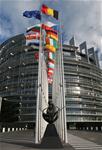Serbs start realising that EU membership is not a panacea
Evelyna Topalova, January 21, 2011
 The European Parliament ratified on January 19th the Stabilisation and Association Agreement (SAA) with Serbia which is seen as a first step towards possible accession to the Union. This is not the end of the procedure, as only 11 of the 27 member states have approved the deal so far. Bulgaria was among the first to do so.
The European Parliament ratified on January 19th the Stabilisation and Association Agreement (SAA) with Serbia which is seen as a first step towards possible accession to the Union. This is not the end of the procedure, as only 11 of the 27 member states have approved the deal so far. Bulgaria was among the first to do so.
Serbia and the European Union signed the SAA on April 29th 2008. Its ratification, however, was launched only two years later after the bloc assessed that Belgrade was exerting efforts to cooperate with the International War Crimes Tribunal for Former Yugoslavia on war crimes suspects (ICTY).
On Wednesday MEPs approved also a resolution on Serbia, drafted by Rapporteur Jelko Kacin (ALDE, Slovenia), which reaffirmed that Serbia's future lied in the EU. The document encourages Belgrade to maintain efforts to achieve this goal and hails progress in the reforms process so far. It also stresses that the cooperation with the ICTY remains a fundamental condition for the country's further progress in the EU integration process. The resolution hails Belgrade's readiness to engage in a dialogue with Pristina, which is essential in terms of the long-term stability in the region. MEPs also call on Serbian authorities to adopt measures to limit the possibilities of abuses of the visa-free regime which is in force as of December 2009. A reason for concern is the large number of bogus asylum seekers in EU member states.
The progress of Belgrade in EU integration and recent visa liberalisation apparently are not sufficient to convince Serbs of the benefits from the EU membership
Serbian government's EU Integration Office published last week a survey which showed that support for EU accession had dropped at the record low level of 57 %. This is the lowest level of support since 2002 when such surveys were launched. In June the support for the EU was 65%. EU Integration Office Director Milica Delevic said that a possible reason for the results was fatigue among Serbs from the numerous promises and few concrete results.
According to the poll, conducted in December, if there was a referendum now 18 per cent of people would vote against EU membership while 20 per cent wouldn't even go to cast their ballot. Another interesting fact is the huge support (78 %) for the reforms stemming from EU accession. Two thirds of the respondents say that reforms must be implemented even if they were not a condition for membership.
This could be interpreted as a change in perception of EU membership. It is no longer perceived as an end in itself but as an incentive to change the situation from the inside. People want a change and the motive "Brussels" obviously works.
Experts, quoted by Belgrade media, say that the reason behind the drop of popularity of the EU is due to the economic crisis. Prof. Zoran Stojiljkovic from the Faculty of Political Sciences told the B92 radio that the closure of some EU countries for work force, coming from the less developed countries, is an indication that the EU is no longer an ideal place. The rise of unemployment in the EU also shows that membership will not solve Serbia's problems with a magic wand.
The survey comes to support this statement. One third of the respondents say that the EU will keep on closing in the future and could even fall apart, while 20% share the opinion that the bloc will be capable to overcome its problems and will continue to admit new members.
 Bakir Izetbegovic, Andrej Plenkovic | © Council of the EU
Bakir Izetbegovic, Andrej Plenkovic | © Council of the EU Aleksandar Vucic, Recep Tayyip Erdogan | © Serbian Presidency
Aleksandar Vucic, Recep Tayyip Erdogan | © Serbian Presidency Jean-Claude Juncker, Zoran Zaev | © European Commission
Jean-Claude Juncker, Zoran Zaev | © European Commission